Written by Israel Akinbode Owolabi, CFE, CMA, CGBA, FCIB
ABSTRACT
The paper examines the relevance of Artificial Intelligence, Machine Learning, Health Internet of Things (H-IoTs) and other disruptive technologies in Nigeria’s health service industry. It critically examined the ethical implications of these technologies. A brief review of Nigeria’s health service industry is examined, as the sector was reputed to be one of the best in the commonwealth some decades ago. However, the sector lost its glory due to neglect by successive governments.
The present conditions of the healthcare system, ranging from brain drain, poor infrastructure, and high health costs for citizens, are critically examined. The data sample was sourced from the World Health Organization. The paper examines various means of addressing these problems, particularly an increase in government expenditure on health care in terms of infrastructural facilities and affordable health delivery services, as well as investment in human capital, thus reducing the brain drain and “japa-syndrome” in the industry. It also suggests the need for private-public partnership and medical insurance provision and the efforts of the private investors in the healthcare industry through providing cutting-edge state-of-the-earth technological innovativeness and embracing Artificial Intelligence and Machine Learning in healthcare to serve the Nigerian people. It concludes with how AI can reduce the incidence of fraud, thus providing a holistic fraud management approach in the industry and the ethical implications of using these technologies.
1.0 INTRODUCTION
The Industrial Revolution has been a driving force in innovativeness in all sectors of human endeavour, and the practice of medical science is not exempted from this emerging revolutionary drive. Consequently, the advent of the World Wide Web has given rise to internet connectivity, Artificial Intelligence, 5G Technology and the Internet of Things, which are changing medical diagnostic practices.
Consequently, 5G and Artificial Intelligence are disruptive technologies that have brought significant revolution to the industrial revolution (John & Jilei, 2020). In addition, industry 4.0 has made it possible for computers and electronic devices to communicate with one another without human intervention (Bernard, 2018), and Industry 4.0 comes with highly skilled individuals to interface with these technologies for quality service delivery, particularly in the medical field.
Industry 5.0 aims to build effective collaboration between robots and humans, necessitating expertise in using these technologies among medical professionals for effective service delivery and ensuring the safety of patients at affordable costs. Figure 1.0 depicts the interaction between AI and medical experts.

Figure 1.0: Depiction Human Interactions with AI
Furthermore, (Keskinbora, 2019) opines that the safety of algorithm design and ethical consideration should be sacrosanct in using Artificial Intelligence. AI is designed by engineers with inherent human elements that could be susceptible to human cognitive biases, errors, racism, and the economic status of patients; hence, it is necessary to mitigate these inherent risks and potential privacy breaches (Rigby, 2019).
2.0 THE NIGERIA’S HEALTH SERVICE
Nigeria’s health service industry, once reputed as one of the best globally, particularly among the commonwealth nations in the 1960s, was adequately funded and manned by trained and dedicated healthcare professionals. (Chukwuma, 2021) The University College Hospital, UCH, was ranked fourth among the best university teaching hospitals within the commonwealth.
During these periods, the Kings of Saudi Arabia came to UCH for medical treatments. However, the same industry has become a shadow of itself. Poorly funded by the government, brain drain has become the order of the day, and citizens’ high cost of medical services owing to high out-of-pocket medical expenditure and poor infrastructural development in the sector.
Globally, the landscape of healthcare services has changed significantly, and Nigeria cannot but explore emerging technologies in healthcare delivery. However, the present structure and lack of political will by various successive governments in Nigeria are considered the bane of the Nigeria health service industry.
From 1999 as shown, figure 2.0 shows that the average Domestic General Government Health Expenditure as a Percentage of GDP fell from the low level of 1.2% in 2004 to abysmal levels of 0.4% and 0.5% between 2014 and 2016 and remained at 0.5% of GDP from 2014 to 2020. This indicates that the government has neglected the healthcare sector, which has attendant consequences for the citizens, resulting in out-of-pocket medical expenses by the average Nigerian, thus bringing untold hardships to the Nigerian people.

Figure 2.0: Average Domestic Gen Govt. Health Expenditure as % GDP
3.0 ETHICAL ISSUES ARISING FROM ARTIFICIAL INTELLIGENCE IN MEDICAL PRACTICES
The medical profession is one of the highly regulated disciplines globally, as the practitioners in the industry have access to the personal data of their clients while rendering care services, hence the need for ethical standards and principles in handling patients’ personal information. Unethical practices often lead to serious legal risk, financial risk, and reputational damages; therefore, the employees in medical practices must adhere strictly to sound ethical conduct (Desjardins, 2014).
For instance, (Josh, 2018) reported a case of a medical doctor who was severely sanctioned for professional misconduct by divulging the medical history of a patient to a cult group. Thus, medical practitioners must uphold good ethical practices when discharging their responsibility.
An ethical dilemma arises when Artificial Intelligence replaces the role of a medical expert, as there could be a data breach where the privacy of the patients is compromised. Who is held accountable in a situation where data is compromised? Thus, there is a need for collaboration between humans and robots in the health service industry.
The engineers merely design the machines, and (Rigby, 2019) contends that AI has been of tremendous use in medical diagnosis. However, the advent of technology has brought in an attendant ethical crisis.
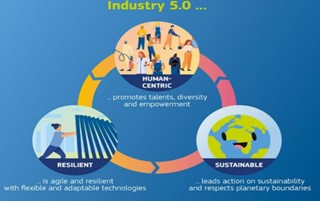
Figure 3.0: Industry 5.0 Model. Source: https://www.i-scoop.eu/industry-4-0/industry-5-0/
3.1 ETHICAL THEORIES AND ARTIFICIAL INTELLIGENCE
Ethical theories can be broadly classified into deontology, consequentialism, and virtue ethics. These moral theories are otherwise known as normative ethics, as they are seen as standards or rules that members of society are expected to comply with (O’Mathúna et al., 2018). These theories are hinged on rational principles from the perspective of the schools of thought at the instance of the prevailing situations and the objective they aim to achieve (Ayn, 2017).
3.2 DEONTOLOGY ETHICS THEORY AND ARTIFICIAL INTELLIGENCE WITH HUMAN INTELLIGENCE
Deontology ethics is intrinsically tied to an individual’s moral duty or obligation to society for such an action to be judged right or wrong. The consequence of an action is immaterial in Deontological moral ethics (Radoilska & Ceva, 2021). Immanuel Kant originated the theory and premised morality on the fact that an individual should do what is right because he has the duty or obligation to do so. (Keskinbora, 2019) suggests precautionary safeguards in the use of Artificial Intelligence And that the rights of others should be adequately protected.
This suggestion also conforms with principles one and two of (RANZCR, 2019) on safety and privacy and (Nicole, 2021) World Health Organization principles on safety and privacy. However, when AI (Haider, 2019) informed a patient, in the presence of his granddaughter, that he was going to die, he breached ethical standards as enunciated by Deontological theory and the standards set by the World Health Organization.
This underscores the need for experts and Artificial Intelligence to work collaboratively. For instance, (Amy, 2016 Paulinuso 2021) reported a Nigerian Surgeon who led other medical professionals to operate on tumours found in an unborn baby. The unborn baby was removed from the mother’s womb, and the tumour was operated on successfully by these medical experts and later returned to the mother’s womb. The baby was delivered at the appropriate time.
This shows that where human experts and AI work collaboratively, the best result will be achieved, as AI could not have achieved the success story without human expertise. These medical experts felt that they were responsible for saving the child’s life and that of the mother, and they used their professional skills and training in conjunction with technologies to save lives, which agrees with Deontological ethical theory.
Indeed, Industry 5.0 is geared towards synergy between AI and human experts to deliver improved services ethically, safely and in the overall interests of society (Demir et al., 2019). Figure 3.0 further emphasises the three pillars of Industry 5.0, which are human-centric, resilient, and sustainable, laying credence on collaboration between humans and Artificial Intelligence.
3.3 CONSEQUENTIALISM AND ARTIFICIAL INTELLIGENCE CONCERNING HUMAN INTELLIGENCE
The theory of consequentialism is premised on the outcome of one’s action and whether it is right or wrong. Where the consequence produces good results, it is considered ethical, but where the resultant effect of an action is harmful, it becomes unethical or wrong (Ayn, 2017; Kim et al., 2018). It follows, therefore, that where Artificial Intelligence produces terrible outcomes, such as announcing the death of an individual in the presence of his granddaughter, it is considered unethical since it produces negative consequences.
However, where it brings maximum utility, such as diagnosing skin cancer more efficiently, faster, and less costly than humans (Rigby, 2019), it is considered ethical, as it produces positive consequences for an individual. Nonetheless, the World Health Organization Principle requires that artificial intelligence be subjected to “Protection Autonomy”, where human supervision is put in place (Nicole, 2021).
Consequently, the recent breakthrough in the medical field of Xenotransplants, where a pig’s kidney was successfully transplanted into a human in the USA (Cooper & Byrne, 2020), brings positive consequences to society. Hence, it is considered ethical, even though the Islamic faith abhors the consumption of pigs as meat, yet it supports this medical success since it is geared towards saving lives (Reem, 2021) because it will lead to good consequences. This also lays credence to collaboration between Artificial Intelligence and Human Intelligence, thus emphasising the need for both AI and human elements in medical diagnosis.
3.4 VIRTUE ETHICS AND ARTIFICIAL INTELLIGENCE IN RELATION WITH HUMAN INTELLIGENCE
Virtue ethics is not based on rules or individual actions but on moral values and how virtuous an individual is. It considers attributes such as courage, integrity, honesty, and generosity to determine whether the individual is ethical (Hill, 2021; Radoilska & Ceva, 2021). Aristotle, the Greek philosopher who originated virtue ethics, emphasised the importance of courage as a virtue and, in addition to other virtue ethics principles such as truthfulness, modesty, and magnanimity and that these values will bring about a just society where everyone will feel happy (Radoilska & Ceva, 2021).
Virtue ethics is considered a bridge between the Deontological and Consequentialism schools of thought, and it has become the most popular ethics theory as organisations design ethical principles around this theory (Ayn, 2017).
It is virtuous to live rather than kill someone, even terminating the life of an unborn baby. (Paulinuso, 2021) (Amy B, 2016) The medical experts who saved the lives of the unborn baby and the mother acted virtuously; they summoned the courage to perform the task despite the inherent risks involved. They succeeded in surgical operations with their expertise and modern technology, such as artificial intelligence. They were happy about the success and brought happiness to the baby’s family. This is the hallmark of virtue ethics. Similarly, the success recorded in xenotransplant is aimed at saving human lives, which brings happiness to all and Sundry, thus aligning with virtue ethics principles.
4.0 THEORETICAL AND LEGAL PRINCIPLES APPLICABLE TO ARTIFICIAL INTELLIGENCE
Contemporary and emerging technologies are geared towards synergy between human experts and artificial intelligence. According to (Demir et al., 2019), industry 5.0 will complement Industry 4.0, where trained experts will interface with AI to improve service delivery. The opinion expressed (Ranjana, 2020) that robots will render obsolete runs contrary to the framework of Industry 5.0. Thus, AI and human experts are meant to complement each other, as enunciated in the principles governing the deployment and implementation of Artificial Intelligence.
4.1 PRINCIPLES OF ARTIFICIAL INTELLIGENCE
- Human Oversight on using AI and Medical Experts should have the final say.
- Human Safety.
- Transparency in the use of AI.
- Probity and Accountability.
- Unbiased Algorithm.
- Ethical Frameworks.
- Government Regulatory Framework and Supervision.
- Privacy and Data Protection
4.1 a Human Oversight
Human oversight is highly imperative as human intervention is needed to ensure that the best outcome is achieved. (Jennifer, 2019) argues that despite the effectiveness of AI, there is a need for human experts’ involvement as this will lead to the best outcomes (Donovan, 2020). The principle of the World Health Organization also corroborates this view.
4.1 b Human Safety
The safety of the patients should be sacrosanct in the use of AI as provided for in the WHO principle, where it is required that AI should not cause harm or injury to patients, where a robotic doctor announcing the death of a patient does not connote human safety, as reported (Haider, 2019).
4.1 c Transparency in the Artificial Intelligence
A proper audit trial of AI should be maintained as this will bring about transparency in its activities, as any form of opaqueness may lead to severe infractions. According to (RANZCR, 2019) and (Cohen, 2021), transparency is highly imperative, and medical experts should easily interpret the results produced.
4.1 d Probity and Accountability
This is where human value is applicable, which also emphasises the involvement of the human element in the use of AI (Michael J.) asserts that human expertise is needed in its use, as they will bring to bear the moral principles and will hold themselves accountable, attributes which are grossly lacking in Artificial Intelligence.
4.1 e Unbiased Algorithm
The design and configuration of the algorithm for Artificial Intelligence should be without prejudice to sex, race, or financial status, and simulation must be conducted to ensure that the algorithm is unbiased before its real-life application. (Cohen, 2021) Furthermore, (Muller et al., 2021) opine that AI must be constantly monitored for transparency and objectivity.
4.1 f Ethical Frameworks
There is a need to balance the inherent risks in AI and the associated benefits, and this underscores the importance of ethical frameworks that will ensure that the interest of the patients is paramount (Rudzicz & Saqur, 2020) opine that the roles of the doctors will always be relevant even at the face of AI deployed in medical practices.
4.1 g Government Regulatory Framework and Supervision
The government must implement an agency that oversees AI in the medical field, safeguarding the public’s interest and protecting their privacy. The agency must be saddled with the responsibility of monitoring, compliance and using the instrumentality of the legal system for enforcement (RANZCR, 2019).
4.1 h Privacy and Data Protection
The privacy of the patients must always be protected. The patient’s consent will be required before his data can be transferred or for other purposes, and where applicable, legal requirements will be needed for such transfer. (Muller et al., 2021) (RANZCR, 2019).
5.0 THE FINANCIAL BURDEN OF HEALTHCARE EXPENDITURE
The incidental cost of healthcare service delivery has been a subject of debate among various stakeholders, as most medical expenses are borne by the members of the society as out-of-pocket health expenditures, thereby robbing them of their disposable income, mainly in Africa and particularly in Nigeria. In addition, the diseases are misdiagnosed in several instances, which apparently may lead to permanent disability or even death in some instances.
Consequently, out-of-pocket health expenditure has exacerbated the poverty level of most Nigerians (Owumi and Eboh, 2022) It asserts that financial resources that could have been used for food and other essential household items are used for medical expenses. According to data from the World Health Organization “Global Health Expenditure Database (who. int)”, Nigeria accounts for 71.03% of out-of-pocket health expenditure, one of the highest in Africa. Figure 4.0. shows the out-of-pocket health expenditure in Africa.
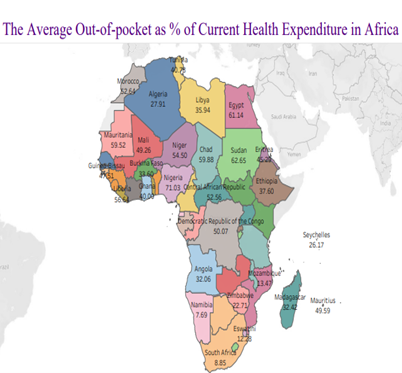
Figure 4.0: Health Care Expenditures in African Countries
Namibia and South Africa recorded an average of 7.69% and 8.85% out-of-pocket health expenditure, respectively. This underscores the need for relevant agencies in Nigeria, particularly the government, to design health policies to reduce the impact of medical expenses on Nigerians.
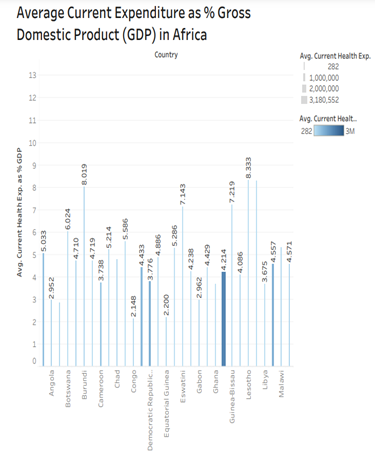
Figure 5.0: Ave Current Expenditures as %GDP in Africa
Similarly, Nigeria recorded abysmal average current expenditure as % of GDP in Africa. In Figure 5.0, Nigeria accounted for 3.605% of its Current Expenditure on Health as a percentage of the GDP compared to Sierra Leone, accounting for 11.733% of its GDP, thus negatively impacting the financial resources of an average Nigeria. In addition,
Figure 6.0 indicates that Nigeria accounted for 0.648% of the Average Domestic General Expenditure, one of the poorest in Africa compared to Lesotho, which accounted for 4.519% of its Average Domestic General Government Expenditure. The government of Nigeria has been cutting down its budgetary provisions on health, as indicated in Figure 5.0, and this hurts Nigerians in meeting other financial responsibilities due to the country’s high out-of-pocket health expenditure level.
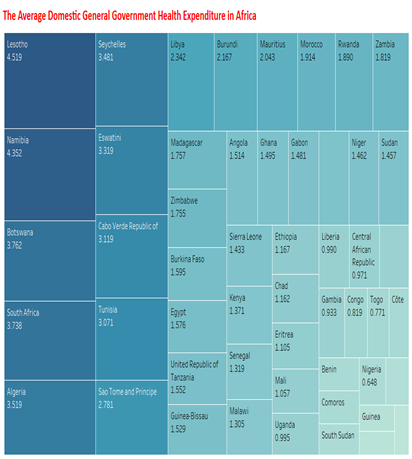
Figure 6.0: Ave Domestic Gen Govt. Health Expenditures in Africa
6.0 ADDRESSING THE COST IMPLICATIONS OF THE NIGERIAN HEALTH SYSTEM
The Nigerian populace has been on the receiving end of the costs associated with healthcare services, as the government has not demonstrated the political will to address the challenge. For instance, in 2000, the average domestic general government health expenditure as a percentage of the GDP was 0.6%, which declined further to 0.5% in 2002; however, it rose to 1.2% in 2002 and has continued to witness the decline and, as of 2020, it stood as0.5% as shown in figure 6.0.
This has placed a severe burden on the citizens as out-of-pocket as a percentage of current health expenditure increased from 60.20% in 2000 to 72.80 in 2004, and as of 2020, it has increased to 74.70, as indicated in figure 7.0.
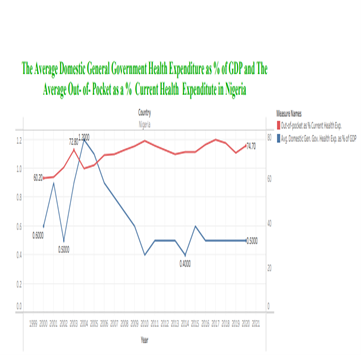
Figure 7.0: Ave Domestic Gen Govt Expenditures % GDP and Ave OOP % Current Health Exp. In Nigeria
The government should make concerted efforts to reduce the cost of health for the citizens and work with the private sector to provide affordable healthcare. In addition, the importance of leveraging technologies, such as Artificial Intelligence, 5-G Technologies, and the Internet of Things (IoTs) in health diagnoses and providing the needed equipment, training, and retraining of professionals in the industry to address the brain drain in the sector cannot be overemphasised. This will boost the sector and human capital development, particularly where medical practitioners are well-remunerated and encouraged to stay home against searching for greener pastures without grass.
Medical misdiagnosis is one of the most significant health-related challenges, accounting for increased health expenditure. AI can address the impact of medical misdiagnosis using predictive and prescriptive analytics. In addition, Fraud has been one of the banes of the healthcare industry and a severe threat to reforming the sector. (Akokuwebe and Idemudia, 2023). In addition, AI will create opportunities for the health service industry in the areas of research, data collection and storage, as well as making effective decisions for the benefit of the patients and other professionals in the industry, as Health Care Internet of Things (H-IoT) enhances data collection, training and testing of algorithm and for effective decision making (Kumar et al., 2023).
AI has the capability of reducing the opaqueness associated with medical audits and promoting transparency, use of financial resources, and efficient service delivery (Koreff et al., 2021) Furthermore, it will reduce the incidence of fraud in Nigeria’s healthcare services.
6.1 THE PRIVATE SECTOR PARTICIPATION IN HEALTHCARE DELIVERY
The private sector investment in healthcare services has increased significantly, even though this can still be improved. Private health practitioners now use state-of-the-art technologies in Nigeria’s health industry, and they can favourably compete with other services across the globe (Ogundipe, 2023) A successful minimal-invasive heart surgery was carried out in Nigeria, which was less risky for patients and less costly than open heart surgery, thus a significant achievement in the health industry in Nigeria.
In Figure 8.0, the private sector expenditure as a percentage of current expenditure in Nigeria in 2010 was 80.10% compared with South Africa, which recorded 41.00% during the same year. Despite dropping to 75.40% in 2020, Nigeria still has the highest private sector-led investment in healthcare services compared with other Selected African countries, as depicted in Figure 8.0.
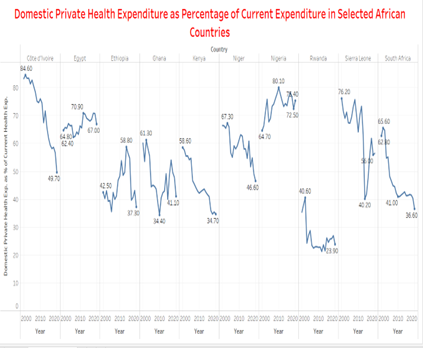
Figure 8.0: Domestic Private Health Expenditures as % Current Expenditures in Selected African Countries
7.0 CONCLUSION
The benefits of Artificial Intelligence cannot be overemphasised, and thus, its importance in medical practices for advancing healthcare delivery. However, human intelligence is equally importance in health delivery, and the emerging industry 5.0 also lays credence to the collaboration between Artificial Intelligence and medical experts that are resourceful in interfacing with AI and act ethically, transparently and hold themselves accountable to the patients, thereby guaranteeing safety of the patient and the general society.
In addition, artificial intelligence will help improve the healthcare industry in Nigeria, promote medical diagnosis, reduce medical expenditure costs, and reduce wastage and fraudulent practices in the industry. Governments at all levels need to increase their expenditures on healthcare delivery and promote private-led investment in the sector. Concerted efforts should be made to reduce out-of-pocket health expenditures and urgently address the brain drain in the healthcare sector.
REFERENCES
AKOKUWEBE, M. E. & IDEMUDIA, E. S. 2023. Fraud within the Nigerian health system, a double threat for the resilience of a health system and the response to the COVID-19 pandemic: a review. The Pan African Medical Journal, 45.
AMY B, W. (2016). The baby who was ‘born’ twice. Available from: https://www.washingtonpost.com/news/speaking-of-science/wp/2016/10/26/the-baby-who-was- born-twice/.
AYN, R. (2017). Ethical Theories Summarized & Explained: Consequentialism, Deontology, Virtue Ethics, and Objectivist Ethical Egoism [Online].Available: https://objectivismindepth.com/2017/04/23/ethical- theories-summarized-explained-consequentialism-deontology-virtue-ethics-and-objectivist-ethical- egoism/ [Accessed].
BERNARD, M. 2018. What is Industry 4.0_ Here is A Super Easy Explanation For Anyone. Available from: https://www.forbes.com/sites/bernardmarr/2018/09/02/what-is-industry-4-0-heres-a-super-easy-explanation-for-anyone/?sh=2fd03d2b9788.
CHUKWUMA, M. (2021). After 61 years, where the health sector stands: Experts speak on the way forward [Online]. The Guardian. Available: https://guardian.ng/features/after-61-years-where-the-health-sector-stands-experts-speak-on-way-forward/ [Accessed].
COHEN, J. K. 2021. BUILDING UNBIASED AI: Health systems and payers are trying new approaches to cut down the likelihood of bias unintentionally creeping in at each stage of AI. Modern Healthcare, 52, 18-18.
COOPER, D. K. C. & BYRNE, G. 2020. Clinical xenotransplantation: pathways and progress in the transplantation of organs and tissues between species, Cham, Switzerland, Springer.
DEMIR, K. A., DÖVEN, G. & SEZEN, B. 2019. Industry 5.0 and Human-Robot Co-working. Procedia computer science, 158, 688-695
DEMIR, K. A., DÖVEN, G. & SEZEN, B. 2019. Industry 5.0 and Human-Robot Co-working. Procedia computer science, 158, 688-695.
DESJARDINS, J. R. 2014. An introduction to business ethics, New York, NY, McGraw-Hill/Irwin.
DONOVAN, A. (2020). 15 Medical Robots That Are Changing the World. Available from: https://interestingengineering.com/15-medical-robots-that-are-changing-the-world.
HAIDER, W. (2019). A “robot” doctor told a patient he was dying. It might not be the last time. Available from:https://www.vox.com/first-person/2019/3/13/18262481/robot-doctor-remote-telepresence-care- terminal-patient.
HILL, J. T. E. 2021. Beyond Duty: Kantian Ideals of Respect, Beneficence, and Appreciation, Oxford, Oxford University Press.
JOHN E., S. & JILEI, H. 2020. 5G+AI The ingredients are fueling tomorrow’s tech innovations. Available from: https://www.qualcomm.com/news/onq/2020/02/04/5gai-ingredients-fueling-tomorrows-tech- innovations.
JOSH, R. 2018. The doctor who gave the patient’s medical history to the Universal Medicine ‘cult’ stands down from AMA. Available from: https://www.abc.net.au/news/2018-05-02/doctor-gave-patient-medical-history-to- universal-medicine/9710412.
KESKINBORA, K. H. 2019. Medical ethics considerations on artificial intelligence. J Clin Neurosci, 64, 277-282.
KIM, S., COLICCHIA, C. & MENACHOF, D. 2018. Ethical Sourcing: An Analysis of the Literature and Implications for Future Research. Journal of Business Ethics, 152, 1033-1052.
KOREFF, J., WEISNER, M. & SUTTON, S. G. 2021. Data analytics (ab) use in healthcare fraud audits—International Journal of Accounting Information Systems, 42, 100523.
KUMAR, M., KUMAR, A., VERMA, S., BHATTACHARYA, P., GHIMIRE, D., KIM, S.-H. & HOSEN, A. S. M. S. 2023. Healthcare Internet of Things (H-IoT): Current Trends, Future Prospects, Applications, Challenges, and Security Issues. Electronics (Basel), 12, 2050.
NICOLE, W. (2021). WHO outlines principles for ethics in health AI Available from: https://www.theverge.com/2021/6/30/22557119/who-ethics-ai-healthcare.
O’MATHÚNA, D. P., DRANSEIKA, V. & GORDIJN, B. 2018. Disasters: Core Concepts and Ethical Theories, Cham, Springer International Publishing.
AKOKUWEBE, M. E. & IDEMUDIA, E. S. 2023. Fraud within the Nigerian health system, a double threat for the resilience of a health system and the response to the COVID-19 pandemic: a review. The Pan African medical journal, 45.
CHUKWUMA, M. (2021). After 61 years, where the health sector stands:
Experts speak on the way forward [Online]. The Guardian. Available: https://guardian.ng/features/after-61-years-where-the-health-sector-stands-experts-speak-on-way-forward/ [Accessed].
KOREFF, J., WEISNER, M. & SUTTON, S. G. 2021. Data analytics (ab) use in healthcare fraud audits—International Journal of Accounting Information Systems, 42, 100523.
KUMAR, M., KUMAR, A., VERMA, S., BHATTACHARYA, P., GHIMIRE, D., KIM, S.-H. & HOSEN, A. S. M. S. 2023. Healthcare Internet of Things (H-IoT): Current Trends, Future Prospects, Applications, Challenges, and Security Issues. Electronics (Basel), 12, 2050.
OGUNDIPE, S. (2023). Tristate Hospital pioneers minimal invasive heart surgery in Nigeria [Online]. Lagos, Nigeria: Vanguard. Available: https://www.vanguardngr.com/2023/08/tristate-hospital-pioneers-minimal-invasive-heart-surgery-in-nigeria/ [Accessed].
OWUMI, B. E. & EBOH, A. 2022. An assessment of the contribution of healthcare expenditure to life expectancy at birth in Nigeria. Journal of Public Health, 30, 2113-2121.
PAULINUSO. 2021. Dr. Oluyinka Olutoye MD, Ph.D…The Baby That Was Born Twice. Available from: https://www.africagiant.org/2021/07/14/dr-oluyinka-olutoye-md-ph-d-the-baby-that-was-born- twice/#:~:text=Breathtaking%2C%20the%20infant%20who%20was%20conceived%20twice.%20An,m other%E2%80%99s%20womb.%20A%20field%20that%20has%20worldwide%20recognition.
RADOILSKA, L. & CEVA, E. 2021. Ethical Theory and Moral Practice at 24. Ethical theory and moral practice, 24, 1-3.
RANZCR. (2019). Ethical Principles for AI in Medicine. Available from: https://www.ranzcr.com.
REEM, A.-S. 2021. Islamic teaching tells us that animal organ transplants to humans are permissible. Available from: https://english.alarabiya.net/views/2022/01/25/Islamic-teaching-tells-us-animal-organ-transplants- to-humans-are-permissible.
RIGBY, M. J. (2019). Ethical Dimensions of Using Artificial Intelligence in Health Care. AMA Journal of Ethics, pp. 21, 121–124.


